Ford Transit Bus VS VW Caddy Compact Van – Specs, Efficiency & Price Comparison
Find out now which car fits your needs better!
The Ford Transit Bus (Bus) is powered by a Diesel engine and comes with a Automatic transmission. In comparison, the VW Caddy Compact Van (Cargo Van) features a Petrol, Diesel or Plugin Hybrid engine and a Manuel or Automatic gearbox.
When it comes to boot capacity, the Ford Transit Bus offers 0 L, while the VW Caddy Compact Van provides – depending on what matters most to you. If you’re looking for more power, you’ll need to decide whether the 150 HP of the Ford Transit Bus or the 150 HP of the VW Caddy Compact Van suits your needs better.
There are also differences in efficiency: 9.40 L vs 0.50 L. In terms of price, the Ford Transit Bus starts at 50500 £, while the VW Caddy Compact Van is available from 25800 £.
Compare all the key specs now and find out which model fits your lifestyle best!
Ford Transit Bus
The Ford Transit Bus is renowned for its robust performance and spacious interior, making it an ideal choice for both commercial and personal use. With its efficient handling and modern design, it effortlessly combines practicality with comfort. Its adaptability and versatility ensure it meets the demands of various driving needs, from urban transport to long-distance journeys.
details @ media.ford.com
@ media.ford.com
 @ media.ford.com
@ media.ford.com
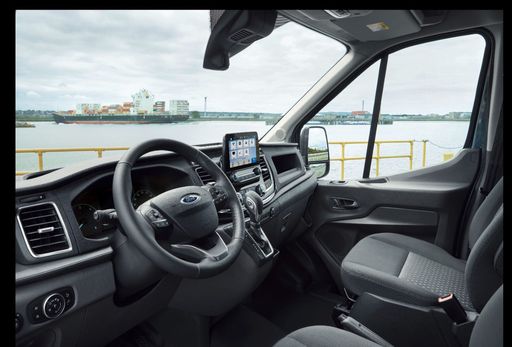 @ media.ford.com
@ media.ford.com
VW Caddy Compact Van
The VW Caddy small van is a versatile option for those seeking a practical and efficient transporter. With its sleek design and innovative features, it caters well to both business needs and everyday convenience. The interior is thoughtfully designed, offering comfort and ample space for cargo or passengers, making it a reliable choice for various tasks.
details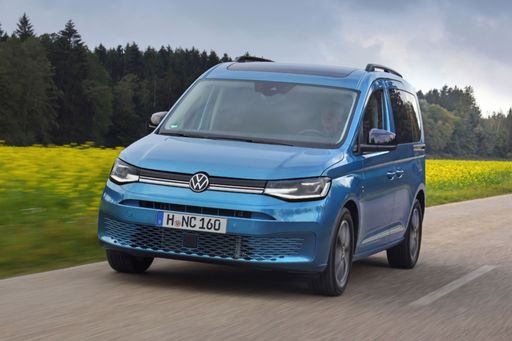 @ vwpress
@ vwpress
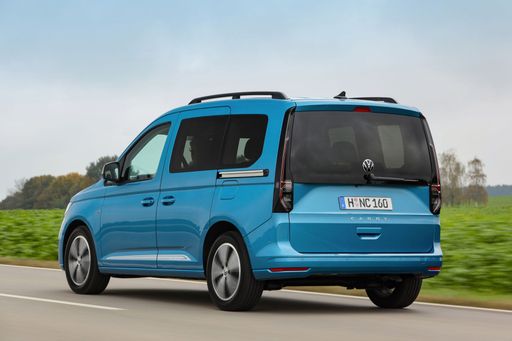 @ vwpress
@ vwpress
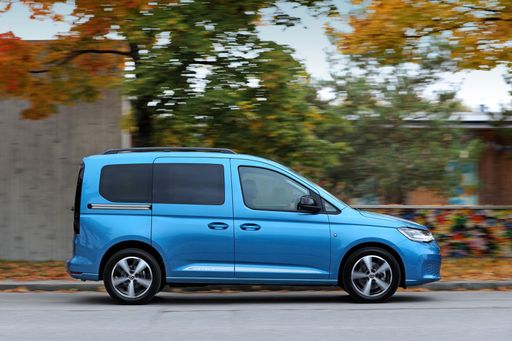 @ vwpress
@ vwpress
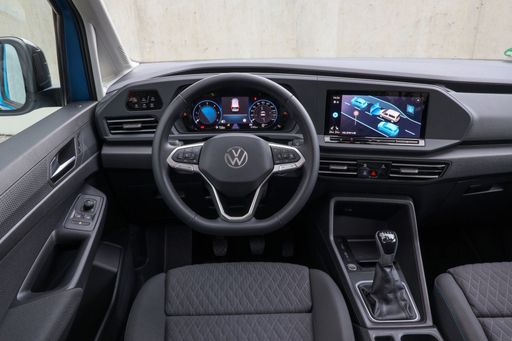 @ vwpress
@ vwpress

|

|
|
|
|
Costs and Consumption |
|
|---|---|
|
Price
50500 - 52900 £
|
Price
25800 - 42300 £
|
|
Consumption L/100km
9.4 - 9.5 L
|
Consumption L/100km
0.5 - 6.8 L
|
|
Consumption kWh/100km
-
|
Consumption kWh/100km
-
|
|
Electric Range
-
|
Electric Range
117 - 120 km
|
|
Battery Capacity
-
|
Battery Capacity
19.70 kWh
|
|
co2
245 - 248 g/km
|
co2
11 - 154 g/km
|
|
Fuel tank capacity
70 L
|
Fuel tank capacity
50 L
|
Dimensions and Body |
|
|---|---|
|
Body Type
Bus
|
Body Type
Cargo Van
|
|
Seats
9
|
Seats
2
|
|
Doors
4
|
Doors
4 - 5
|
|
Curb weight
2338 - 2385 kg
|
Curb weight
1442 - 1818 kg
|
|
Trunk capacity
0 L
|
Trunk capacity
-
|
|
Length
5531 - 5981 mm
|
Length
4500 - 4853 mm
|
|
Width
2059 mm
|
Width
1855 mm
|
|
Height
2530 - 2533 mm
|
Height
1819 - 1823 mm
|
|
Payload
1115 - 1162 kg
|
Payload
628 - 759 kg
|
Engine and Performance |
|
|---|---|
|
Engine Type
Diesel
|
Engine Type
Petrol, Diesel, Plugin Hybrid
|
|
Transmission
Automatic
|
Transmission
Manuel, Automatic
|
|
Transmission Detail
Automatikgetriebe
|
Transmission Detail
Manual Gearbox, Dual-Clutch Automatic
|
|
Drive Type
Front-Wheel Drive
|
Drive Type
Front-Wheel Drive, All-Wheel Drive
|
|
Power HP
130 - 150 HP
|
Power HP
102 - 150 HP
|
|
Acceleration 0-100km/h
-
|
Acceleration 0-100km/h
-
|
|
Max Speed
-
|
Max Speed
175 - 186 km/h
|
|
Torque
360 - 390 Nm
|
Torque
220 - 320 Nm
|
|
Number of Cylinders
4
|
Number of Cylinders
4
|
|
Power kW
96 - 110 kW
|
Power kW
75 - 110 kW
|
|
Engine capacity
1995 cm3
|
Engine capacity
1498 - 1968 cm3
|
General |
|
|---|---|
|
Model Year
2024
|
Model Year
2024
|
|
CO2 Efficiency Class
G
|
CO2 Efficiency Class
E, B
|
|
Brand
Ford
|
Brand
VW
|
Ford Transit Bus
The Versatile Ford Transit Bus from Ford
The Ford Transit Bus has always been a leader in the category of commercial passenger vehicles, and the 2024 model continues this legacy with a blend of reliability, innovation and modern design. With a range of configurations, the Ford Transit Bus is aimed at meeting the needs of businesses and individuals who require a spacious, dependable mode of transport.
Under the Bonnet: Technical Mastery
Power comes from a 2.0 EcoBlue diesel engine, available in power outputs of 130 and 150 PS. The engine is combined with an automatic transmission, ensuring a smooth drive even when fully laden. This Euro 6 compliant powerplant is designed for efficiency without sacrificing performance, sporting a fuel consumption range of 9.4 to 9.5 L/100km and an associated CO2 output of 245 to 248 g/km. Such numbers ensure that the Ford Transit Bus strikes a balance between power and economy.
Room to Spare: Exceptional Capacity and Comfort
The Ford Transit Bus is not just about getting from A to B; it’s about transporting passengers with utmost comfort. Depending on the specifications, the bus can accommodate between eight to nine passengers. The spacious interior is accompanied by an array of comfort features under the ‘Trend Automatik’ trim level, offering a practical and enjoyable ride experience for both drivers and passengers alike.
Dimensions and Practicality
Designed with practicality in mind, the Ford Transit Bus boasts dimensions that are fully suited to a variety of professional needs. Its length ranges from 5531 to 5981 mm, with a consistent width of 2059 mm and a height range from 2530 to 2533 mm. This translates to a generous loading capacity with a payload ranging from 789 to 1162 kg, making it a versatile option for businesses requiring ample cargo space alongside passenger accommodation.
Advanced Technology for Modern Roads
Aside from its primary function as a people mover, the Ford Transit Bus also shines with its technological prowess. It integrates advanced driver assistance systems aimed at ensuring both active and passive safety. This includes features that help drivers navigate through complex traffic situations and ensure maximum safety for all passengers.
A Smart Investment
The Ford Transit Bus is a competitive contender in its segment, offering not just performance and reliability but also reasonable costing. With monthly running costs ranging from €1,654 to €1,730 and cost per kilometre between 66.2 and 69.2 cents, businesses can expect an affordable operation without unexpected hikes in upkeep costs.
In conclusion, the Ford Transit Bus remains a clear front-runner among its peers, offering a combination of cutting-edge technology, impressive fuel efficiency, and a spacious, comfortable interior. Whether you are looking to enhance your fleet or need a robust transport solution, the Ford Transit Bus is a sound choice for the discerning buyer in 2024.
VW Caddy Compact Van
Compact Versatility: A Closer Look at the VW Caddy Compact Van
The VW Caddy Compact Van has long been a staple in the commercial vehicle sector, offering a versatile and robust solution for professionals and businesses alike. Combining impressive technical capabilities with innovative features, the latest iteration of the Caddy Compact Van continues to uphold its legacy as a dependable and efficient vehicle.
Engine Performance and Efficiency
At the heart of the VW Caddy Compact Van lies an efficient and powerful engine range designed to meet varying performance needs. The van comes with several engine options, including economical yet robust diesel engines and responsive petrol variants. These engines have been engineered to optimize fuel efficiency without compromising on power, making the van a cost-effective option for urban deliveries and long highway journeys alike.
Innovative Design and Practicality
The VW Caddy Compact Van features a meticulously crafted design that focuses on practicality and space utilization. Its compact dimensions are perfect for navigating busy city streets, while the interior offers a surprisingly spacious cargo area. This innovative design ensures that every inch of space is used effectively, maximizing cargo capacity without affecting driver and passenger comfort.
Advanced Technology for Modern Needs
Embracing modern technology, the VW Caddy Compact Van is equipped with a host of intelligent systems aimed at enhancing safety and convenience. The van features advanced driver-assistance systems, including adaptive cruise control, park assist, and a rear-view camera. These features contribute to a safer driving experience, whether maneuvering through narrow city streets or handling larger loads on the highway.
Comfort and Convenience Inside
Inside, the VW Caddy Compact Van presents a blend of comfort and practicality. The ergonomic design ensures that all controls are within easy reach, allowing the driver to focus on the road. Optional infotainment systems and connectivity features, such as smartphone integration and Bluetooth connectivity, provide a seamless driving experience, turning the Caddy into a mobile office on wheels.
Environmental Responsibility
In light of increasing environmental awareness, the VW Caddy Compact Van has been designed to minimize its ecological footprint. The efficient engine options produce low CO2 emissions while adhering to stringent environmental standards. This commitment to environmental responsibility makes the Caddy a smart choice for businesses looking to reduce their carbon footprint.
Conclusion: A Dependable Partner
In conclusion, the VW Caddy Compact Van remains a leader in its class, offering a dynamic combination of performance, efficiency, and practicality. Its innovative features and advanced technology cater to the diverse needs of modern businesses, ensuring the Caddy is not just a vehicle, but a reliable partner on the road. Whether used for transporting goods or as a mobile workshop, the VW Caddy Compact Van continues to deliver on its promise of versatility and dependability.
The prices and data displayed are estimates based on German list prices and may vary by country. This information is not legally binding.
